Kuroishi
黒石市 | |
|---|---|
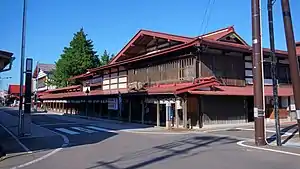 Nakamachi district, Kuroishi City | |
 Flag  Seal | |
Location of Kuroishi in Aomori Prefecture | |
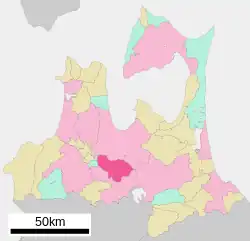 | |
 Kuroishi | |
| Coordinates: 40°38′33.4″N 140°36′40.7″E / 40.642611°N 140.611306°E | |
| Country | Japan |
| Region | Tōhoku |
| Prefecture | Aomori |
| Area | |
| • Total | 217.05 km2 (83.80 sq mi) |
| Population (January 31, 2023) | |
| • Total | 31,540 |
| • Density | 150/km2 (380/sq mi) |
| Time zone | UTC+9 (Japan Standard Time) |
| Phone number | 0173-42-2111 |
| Address | 11-1 Ichinomachi, Kuroishi-shi, Aomori-ken 036-0396 |
| Climate | Cfa/Dfa |
| Website | Official website |
| Symbols | |
| Bird | Japanese wagtail (Motacilla grandis) |
| Flower | Apple (Malus domestica) |
| Tree | Painted maple (Acer mono) |
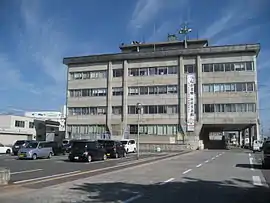
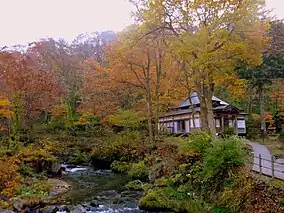
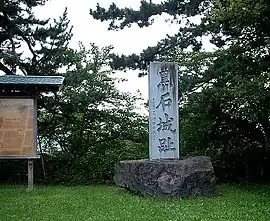
Kuroishi (黒石市, Kuroishi-shi) is a city located in Aomori Prefecture, Japan. As of 31 January 2023, the city had an estimated population of 31,540 in 13948 households [1] and a population density of 150 persons per km2. The total area of the city is 217.05 square kilometers (83.80 sq mi).
Geography
Kuroishi is located in west-central Aomori Prefecture, bordered by the Hakkōda Mountains to be east. The urban area is on the western edge of the city. Part of the city is within the borders of the Kuroishi Onsenkyō Prefectural Natural Park.
Neighboring municipalities
Aomori Prefecture
Climate
The city has a cold humid continental climate (Köppen Dfa) characterized by warm short summers and long cold winters with heavy snowfall. The average annual temperature in Kuroishi is 9.6 °C. The average annual rainfall is 1343 mm with September as the wettest month. The temperatures are highest on average in August, at around 23.3 °C, and lowest in January, at around -2.9 °C.[2]
| Climate data for Kuroishi (1991−2020 normals, extremes 1976−present) | |||||||||||||
|---|---|---|---|---|---|---|---|---|---|---|---|---|---|
| Month | Jan | Feb | Mar | Apr | May | Jun | Jul | Aug | Sep | Oct | Nov | Dec | Year |
| Record high °C (°F) | 11.3 (52.3) |
14.8 (58.6) |
19.9 (67.8) |
27.3 (81.1) |
31.8 (89.2) |
32.5 (90.5) |
35.9 (96.6) |
36.4 (97.5) |
35.0 (95.0) |
28.3 (82.9) |
23.2 (73.8) |
16.6 (61.9) |
36.4 (97.5) |
| Mean daily maximum °C (°F) | 1.1 (34.0) |
1.9 (35.4) |
5.8 (42.4) |
13.6 (56.5) |
19.3 (66.7) |
22.7 (72.9) |
26.2 (79.2) |
27.6 (81.7) |
24.2 (75.6) |
17.9 (64.2) |
10.8 (51.4) |
3.9 (39.0) |
14.6 (58.3) |
| Daily mean °C (°F) | −1.8 (28.8) |
−1.4 (29.5) |
2.0 (35.6) |
8.3 (46.9) |
14.0 (57.2) |
17.9 (64.2) |
21.8 (71.2) |
23.0 (73.4) |
19.0 (66.2) |
12.7 (54.9) |
6.5 (43.7) |
0.7 (33.3) |
10.2 (50.4) |
| Mean daily minimum °C (°F) | −5.2 (22.6) |
−5.2 (22.6) |
−2.1 (28.2) |
3.3 (37.9) |
9.1 (48.4) |
13.9 (57.0) |
18.2 (64.8) |
19.2 (66.6) |
14.5 (58.1) |
7.8 (46.0) |
2.3 (36.1) |
−2.6 (27.3) |
6.1 (43.0) |
| Record low °C (°F) | −18.3 (−0.9) |
−16.5 (2.3) |
−14.4 (6.1) |
−6.4 (20.5) |
0.8 (33.4) |
4.7 (40.5) |
10.0 (50.0) |
9.1 (48.4) |
4.8 (40.6) |
−1.9 (28.6) |
−10.4 (13.3) |
−13.3 (8.1) |
−18.3 (−0.9) |
| Average precipitation mm (inches) | 82.1 (3.23) |
60.5 (2.38) |
49.1 (1.93) |
58.4 (2.30) |
63.4 (2.50) |
66.3 (2.61) |
117.5 (4.63) |
127.9 (5.04) |
125.9 (4.96) |
107.2 (4.22) |
108.7 (4.28) |
92.9 (3.66) |
1,060.1 (41.74) |
| Average precipitation days (≥ 1.0 mm) | 18.3 | 15.2 | 12.7 | 10.3 | 9.0 | 8.2 | 9.2 | 10.1 | 10.9 | 12.9 | 16.0 | 18.6 | 151.4 |
| Mean monthly sunshine hours | 37.6 | 58.1 | 119.1 | 177.3 | 199.1 | 179.5 | 158.4 | 182.8 | 159.1 | 138.0 | 87.6 | 48.1 | 1,544.8 |
| Source: Japan Meteorological Agency[3][4] | |||||||||||||
Demographics
Per Japanese census data,[5] the population of Kuroishi has declined over the past 40 years.
| Year | Pop. | ±% p.a. |
|---|---|---|
| 1960 | 41,033 | — |
| 1970 | 37,690 | −0.85% |
| 1980 | 40,755 | +0.78% |
| 1990 | 39,213 | −0.38% |
| 2000 | 39,059 | −0.04% |
| 2010 | 36,132 | −0.78% |
| 2020 | 31,946 | −1.22% |
History
The area of Kuroishi was part of the holdings of the Tsugaru clan of Hirosaki Domain in the Edo period, and became the semi-independent Kuroishi Domain in 1809. The Nakamachi neighborhood has rows of shops connected by a covered arcade. This arcade dates from 1656 and is a Registered Tangible Cultural Property. After the Meiji Restoration, the town of Kuroishi was established in within Minamitsugaru District in Aomori Prefecture with the establishment of the modern municipalities system on April 1, 1889. The city was founded on 1 July 1954, from the merger of the town of Kuroishi absorbing the villages of Nakagō, Rokugō, Yamagata and Aseishi. On 1 October 1956, Kuroishi absorbed a portion of the neighboring town of Onoe.
Government
Kuroishi has a mayor-council form of government with a directly elected mayor and a unicameral city legislature of 16 members. Kuroishi contributes one member to the Aomori Prefectural Assembly. In terms of national politics, the city is part of Aomori 3rd district of the lower house of the Diet of Japan.
Economy
The economy of Kuroishi is heavily dependent on agriculture. The city serves as a minor regional commercial center. Agricultural produce includes rice and apples.
Art and Culture
Kuroishi has a yuru-chara known as Nyango Star.
Education
Kuroishi has four public elementary schools and two public junior high schools operated by the city government and two public high schools operated by the Aomori Prefectural Board of Education. The prefecture also operates one special education school for the handicapped.
Transportation
Railway
Highway
Sister city relations
 – Miyako, Iwate Prefecture, Japan – from April 1, 1966
– Miyako, Iwate Prefecture, Japan – from April 1, 1966
 – Wenatchee, Washington, United States – from October 5, 1971
– Wenatchee, Washington, United States – from October 5, 1971 – Yeongcheon, Gyeongsangbuk-do, South Korea[6] – from August 17, 1984
– Yeongcheon, Gyeongsangbuk-do, South Korea[6] – from August 17, 1984
Local attractions
- Kuroishi Neputa Festival
- Kuroishi Onsenkyō Prefectural Natural Park
- Kanehiranari-en, National Place of Scenic Beauty [7]<
- Nakamachi Komise Street, Registered Tangible Cultural Property [8]
- Nakano Momiji Mountain
- Tsugaru Traditional Crafts Centre
Noted people from Kuroishi
- Ujaku Akita, playwright, author of children's books
- Takahito Kudo, professional baseball player
References
- ↑ Kuroishi City Official statistics (in Japanese)
- ↑ Kuroishi climate data
- ↑ 観測史上1~10位の値(年間を通じての値). JMA. Retrieved March 5, 2022.
- ↑ 気象庁 / 平年値(年・月ごとの値). JMA. Retrieved March 5, 2022.
- ↑ Kuroishi population statistics
- ↑ "Yeongcheon official home page". Sister cities. Archived from the original on 21 November 2015. Retrieved 20 November 2015.
- ↑ "Kanehiranarien (Sawanarien)". Agency for Cultural Affairs. Retrieved 10 February 2012.
- ↑ "黒石市中町". Agency for Cultural Affairs. Retrieved 10 February 2012.
External links
- Official website(in Japanese)